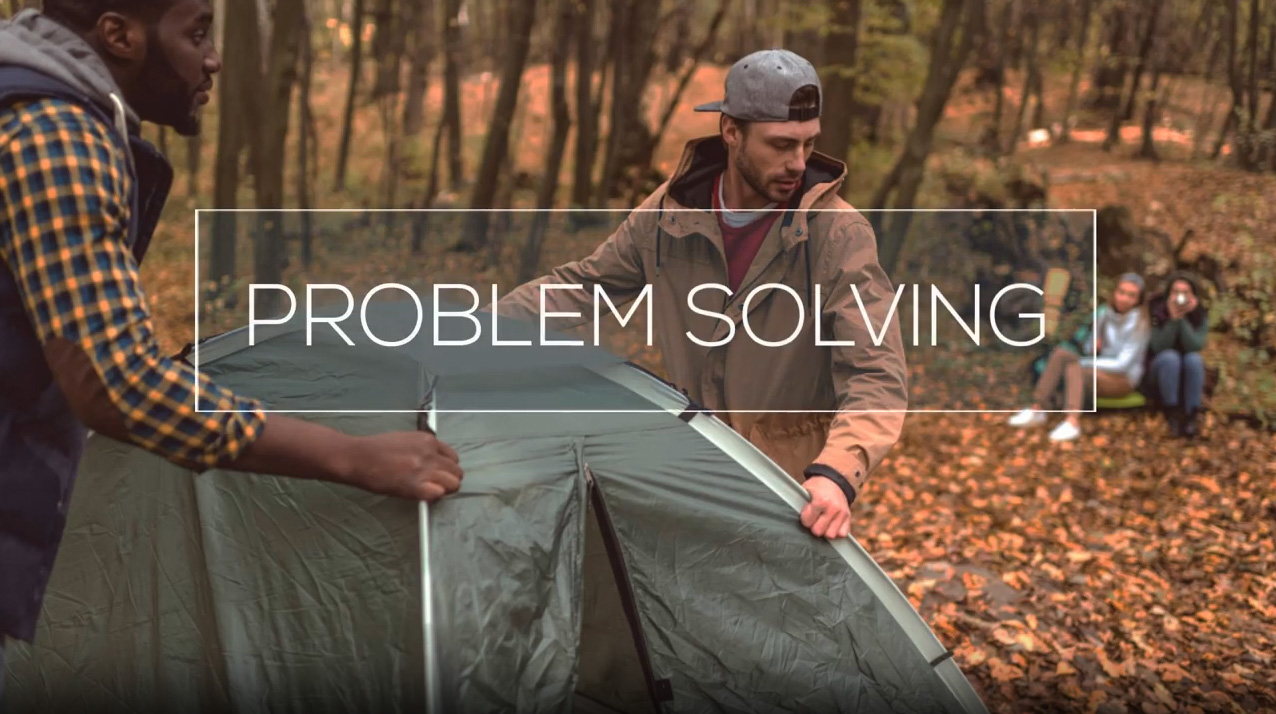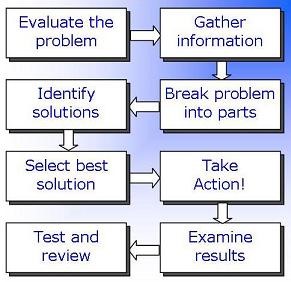
What are Problem Solving Skills?
Problem Solving is an important life and work skill!
In work and in life, problems can crop up. Even if you don’t know how to fix the problem at first, you can think about how the problem happened in the first place. Then you can keep calm and use logic to find some good solutions.
This logical way of looking at things with a clear head is called problem solving. It can be a great way to solve problems without heartache, from dealing with school or college gossip to figuring out next steps if an important parcel didn’t get delivered to work.
Why Is Problem Solving Important?
Life will always have problems to overcome, from figuring out why your phone isn’t working to dealing with a tricky customer at work.
Employers want to know how you deal with problems, because they want you to see a problem as a challenge that can be overcome if you deal with it in a logical way.
How to boost your problem solving…
Get weekly tips like these with our free Young Professional training!
Building Your Problem Solving Skills As A Student
We all get problems at school and beyond.
Are you faced with a problem in homework or even an exam? Have you been asked to put together an argument for an essay or debate?
Even if you don’t know the answer, read the problem several times to make sure you understand all the information being given you. If you’re at home you can research, but in an exam situation try to think about it logically: What are you being asked? How would you go about coming up with a logical solution? If you come with more than one solution, which do you think is the best one and why? If you still don’t know the answer, move onto the next problem and come back and try again with a fresh head.
Many of the problems you face at school can be approached with the five key life skills including motivation, self belief, self management and team working. If the problem involves people, your communication skills will come in handy, too.
With any general problem you come across in life, consider:
- Will it help to prepare in advance or in an organised frame of mind?
- Will it help if you approach the problem as a pair or group instead of dealing with it alone?
- How can you stay motivated to tackle the problem and see it through with a positive attitude?
- Can you approach the problem logically, letting your head rule your heart? (It is easier to find solutions this way).

Building Your Problem Solving Skills At Work
Whenever a problem comes up in work, use this 5-step process to see if you can fix it:
- Describe the problem and set a ‘problem statement’.
- Analyse what is right and what is wrong in the current situation.
- Identify the likely causes of the problem.
- Identify the most probable cause and test this out.
- Take action to address the problem.
You’ve probably found solutions to problems in the past, as well as taking pride in your work, so try to think about what went well and what didn’t. You can use the STARRS method to do this.
Building problem solving skills at work (and in general life) will help you to:
- Evaluate situations and information and break them down into manageable chunks
- See problems in a new light, as possible solutions not impossible challenges
- Build your decision-making skills as you make decisions based on information and logic not pure gut feeling
- Discover strengths and skills in yourself that you might never have known about yourself before
- Learn and grow over time with each problem you’ve overcome
- Show employers that you are practical, creative, flexible and can be relied upon.
How Can You Build Your Problem Solving Skills In Everyday Life?

Take on problems you enjoy
If you like video games, board games or ‘mind’ games like Sudoku you will find these often have problems that need to be approached in a logical way, with strategic planning and trial and error.
Remember that problems can be physical as well as mental
Do you like working with your hands? Car maintenance, DIY and crafting are just some examples of physical work that involves solving problems.
How To Show Your Problem Solving Skills To Employers
Creating a good CV and cover letter
Many of the grades you studied for, work experience you’ve done and even extra-curricular activities you’ve enjoyed have all had problems you had to think about logically in order to find a solution.
Find an example of a problem you solved for each experience you’ve put on your CV.
For each problem, ask yourself how you:
Identified the problem
Defined the problem
Examined the options
Acted on a plan
Looked at the consequences
This is known as the IDEAL method! You don’t need to talk about this on your CV or cover letter, but it will help prepare you for job interviews.
Job interviews
Employers will always be interested to hear how you’ve tackled problems in the past and could ask you to name an example of a problem you solved or overcame in your job interview.
Give them an example from your past school, work or life experience using the IDEAL method.
Problem solving is a life skill you can grow over time.
In life you will get lots of chances to approach problems in a cool, calm and collected way, both inside and outside of work/study.
Next Steps
If you don’t think you do an extra-curricular activity that involves problem solving, add a new hobby to your list where solving problems is a part of what’s involved.
Search for “problem solving skills test” online. You will find lots of online quizzes where you can test yourself on how you solve problems, and discover ways in which you could improve.
Activity: Test Your Problem Solving
See if you can think about the questions below. It’s useful to you to come up with examplesfrom your own life and work experience.
- Why are problem solving skills important to an employer?
- How could you develop your problem solving skills? Give an example.
- How can you demonstrate good communication skills? Give an example.
- How could you demonstrate your problem solving skills to a prospective employer in a job interview? Give an example.
Free Online Courses For Young People
Now you can develop life and work skills in your own time.
Preparing For Your Future

Aged 14-16?
Sign in as a Young Professional to get automatically enrolled.
Have you signed up for FREE Young Professional training?
Skills + Careers Confidence
Want a big boost in your life and work skills? Sign up to our free online Young Professional programme today!
Get FREE skills training when you sign up. Get support with your personal confidence, positive attitude and coping with change!
Self Belief | Communication | Teamwork | Problem Solving | Self Management
Boost your skills and careers confidence with FREE online courses. Complete them your own pace and get a certificate for your CV! Sign in as a Young Professional to get automatically enrolled.
Your First Job / Paid Experience
Looking for jobs and opportunities near you? Sign in as a Young Professional to see the latest jobs, apprenticeships, grad schemes, CV workshops, career events and early career opportunities in your area!
Be Yourself
For Students
For Teachers
Teachers - see how to use the Young Professional programme in your school or college, with lots of free teaching resources at your fingertips.

















